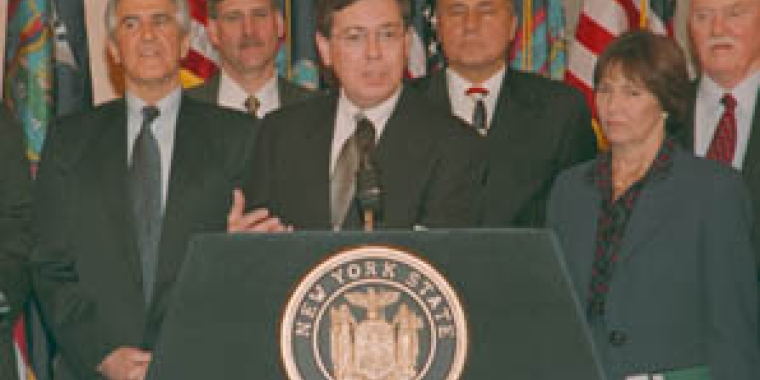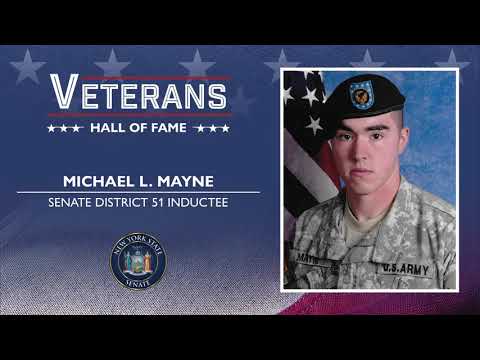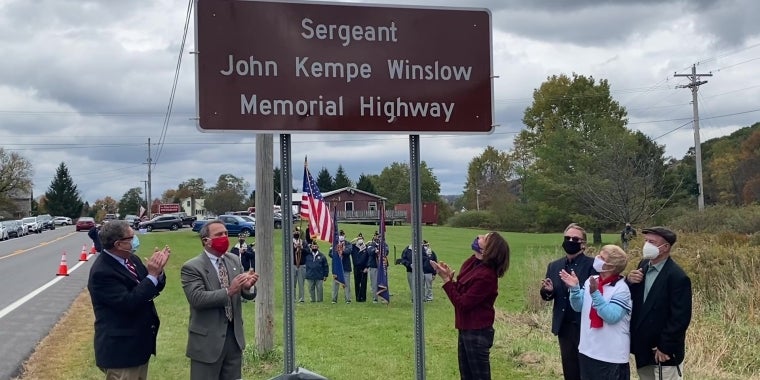
Senate Passes Comprehensive Package Of Dwi Legislation

The New York State Senate has approved a comprehensive package of DWI legislation that will keep repeat DWI offenders off the streets and increase the penalties for drunk driving, especially drunk drivers that severely injure or kill innocent victims, Senator James L. Seward said today.
Seward and fellow senators were joined at a Capitol news conference by Maria Leaf, whose 25 year old brother Bill Leaf, a WSYR reporter and WTVH sports anchor from Liverpool, New York, was killed by a drunken driver traveling the wrong way on Interstate 81.
"The bills we're passing today will make our streets safer for the citizens of the state," Seward said.
"Drinking and driving is a senseless act that causes unnecessary pain and tragedy," said Senator Bruno. "This package of legislation will allow us to continue our efforts to make New York’s roadways the safest in the nation. We have consistently sent a strong message that we will not tolerate drivers who place their lives, and the lives of innocent bystanders, at risk because they make the wrong choice to drink and get behind the wheel of a vehicle. I hope the assembly joins us in passing these bills so we can keep dangerous drunk drivers off the streets."
The senate will act next week on the Bill Leaf-Brandi Woods Law (S.7233), sponsored by Senator John DeFrancisco (R-C-I-WF, Syracuse), that would increase penalties for certain vehicular crimes committed by persons who have previously been convicted on one or more occasions of an alcohol or drug related driving while intoxicated charge or driving while ability impaired charge. The legislation is named after the late Bill Leaf and Brandi Woods, a 15 year old from Memphis, New York who was delivering girl scout cookies on March 17, 2005 when she was struck and killed by a drunk driver.
"It’s deplorable when someone with a prior DWI offense escapes punishment and is back out on the street putting others at risk because they repeatedly choose to drink and drive," said Senator DeFrancisco. "It’s even more heinous when they kill or injure innocent victims. This is exactly what occurred when Bill Leaf and Brandi Woods were tragically killed. These were two promising young adults who were taken from us because two individuals with prior offenses made irresponsible and selfish choices to get behind the wheel of their vehicles while under the influence of alcohol."
"It’s unfortunate that it takes the tragic deaths of Bill Leaf and Brandi Woods for such legislation to even be needed," said Maria Leaf. "But it’s time that those who drive drunk -- especially those who do so repeatedly -- face an appropriate punishment. My hope is that the increased penalties proposed in this bill will make everyone think twice before getting behind the wheel after consuming alcohol."
The senate is also expected to act on legislation (S.7216), sponsored by Senator DeFrancisco, that would ensure that drivers previously convicted of driving while under the influence of alcohol or drugs in other states shall be penalized as if they had been convicted of the prior violation within New York State.
The senate passed the following legislation today:
Increasing Penalties
The New York State Senate passed legislation (S.203), sponsored by Senator George Maziarz (R-C, Newfane) that would create a new Class E felony when a person is convicted of a fourth violation of driving while ability impaired (DWAI), punishable by a fine of between $1,000 and $5,000 and/or imprisonment for a minimum of 1-3 years, and a mandatory driver's license revocation for one year.
Another bill passed today by the senate (S.692-A, Senator Maziarz) would expand the requirement of mandatory imprisonment or community service for repeat convictions of driving while intoxicated, driving while impaired by drugs and commercial vehicle alcohol offenses. The bill also increases the period of revocation of license and registration to two years for the first repeat conviction within 10 years, and four years for the second and subsequent convictions. In addition, during any period of license revocation, the registration of each motor vehicle owned by such a person shall be revoked.
Senator Maziarz also sponsored "Kurt’s Law" (S.210-A), passed today by the senate, that would consider causing the death of another person by driving under the influence of alcohol or drugs to be a violent felony. A violent felony offender must serve a minimum of 2/3 of their sentence. Under the legislation, named for 26 year old Kurt DeWitt who died in 1997 at the hands of a drunk driver, vehicular manslaughter in the second degree would be increased to a class C felony and vehicular manslaughter in the first degree would be a class B felony.
The senate also passed a bill (S.665), sponsored by Senator Carl Marcellino (R, Syosset), that would increase the parameters of driving while ability impaired to include driving while ability is affected to any extent by the utilization of a drug.
Under current law, first time offenders charged with driving under the influence of a drug are offered a plea that allows the defendant to admit to driving while their ability was impaired by alcohol. This legislation will allow law enforcement officials to determine a pattern of drug use by correctly acknowledging the involvement of drugs in the original offense, when issuing a plea bargain.
Also, the senate passed legislation (S.1613-A), sponsored by Senator Joseph Robach (R-C-I-WF, Rochester), that would create stronger penalties for drunk drivers who severely injure or kill people while driving while intoxicated by establishing the crimes of "Aggravated Vehicular Assault," a class C felony, and "Vehicular Murder," a class B felony.
The senate also passed legislation (S.3418), sponsored by Senator Robach, that would enhance the existing criminal sanctions for unlicensed operation of a motor vehicle and require those drivers arrested for aggravated unlicensed operation of a motor vehicle be fingerprinted. Under current law, individuals can continue to violate the law, yet avoid detection.
Blood Alcohol Testing
The senate passed legislation (S.2286) sponsored by Senator Michael Nozzolio (R-C, Fayette), that would require a police officer or district attorney, upon refusal of a driver to submit to a chemical test, to request a court order to compel the driver to submit to such test if there is reasonable cause to believe that alcohol was involved in causing death or serious injury.
In accidents where a death or serious injury occurs, the state's interest in promoting public safety by obtaining BAC evidence of driving while impaired by alcohol outweighs the driver's privilege of refusing the test. There are situations where a court-ordered chemical test would interfere with the ability to provide emergency medical services, and an exception is provided in the bill for such circumstances.
License Revocation
The senate also passed a bill (S.2273), sponsored by Senator Alesi (R-C, Perinton), that increases the minimum length a driver's license can be revoked for the refusal to submit to a chemical test, from six months to one year for a criminal offense. In a case where a person has had a prior revocation for refusing to submit to a chemical test, or has been convicted of or found to be in violation of driving while ability is impaired by drugs or alcohol within the past five years, this bill would extend the minimum revocation from one year to eighteen months.
Under current law, a driver's license is suspended for six months upon a first offense of refusing to submit to a chemical test, and one year when the driver has a prior refusal or a prior conviction of an alcohol related offense.
The senate also passed legislation that would:
> Allow that a person may be prosecuted for aggravated unlicensed operation in the second degree when he or she has two or more suspensions for failure to answer, appear, or pay a fine. Under current law, the person must have had three such suspensions to be prosecuted. (S.659, Senator Marcellino); and
> Allow that a person may be prosecuted for aggravated unlicensed operation in the first degree when he or she has five or more suspensions for failure to answer, appear, or pay a fine. Under current law, the person must have had ten such suspensions to be prosecuted (S.2855, Senator Marcellino).
The bills were sent to the assembly.
####



